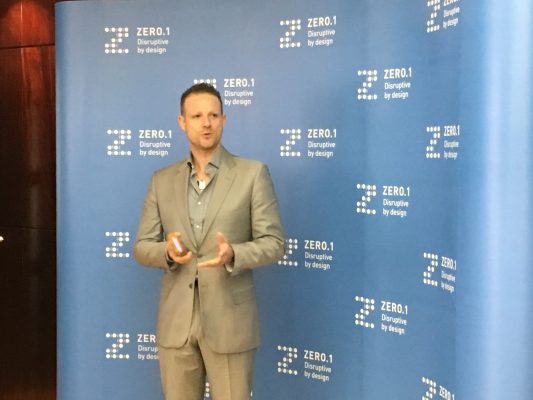UAE-based technology company Zero.1 has successfully launched Light Fidelity (LiFi) in Dubai. LiFi is a new wireless technology that transmits high-speed data using light (such as Visible Light Communication or VLC) rather than radio bands.
LiFi will change the way we work, play and manage our daily lives. This technology brings Dubai’s ambition to be a ‘Smart City’ to life. It provides endless possibilities for the Internet of Things (IoT), the connection between people and things. Zero.1 is at the very heart of this technology.
Zero.1’s research and development team have created a platform of LiFi enabled LED with their IOTA (Intelligent Outdoor Tower Automation) product range which takes the traditional LED street light and adds layers of communications. IOTA changes the way public spaces and resources are managed. Together with the advanced City.1 software, it provides experiential and management solutions for public spaces, community places, industrial hubs and commercial plots.
Marc Fleschen, CEO of Zero.1 says: “We are proud to say that in conjunction with our project partner du, we have been able to initiate the first demonstration of its kind in the Middle East. Working with du we look forward to the roll-out of our LiFi applications in the Dubai ‘Smart City’ platform and the retail sector as the year unfolds.”
Fleschen went on to say, “Any private or public lighting including street lamps can be used to provide LiFi hotspots and the same communications and sensor infrastructure can be used to monitor and control lighting and data. IoS and Android Smartphones can be connected directly using LiFi. Short range links give very high data-speeds and best possible data security. LiFi driven geo-localisation services allow users to benefit from on-the-spot location and services information.”
“Zero.1 supports the vision of His Highness Sheikh Mohammed bin Rashid Al Maktoum, Vice-President and Prime Minister of the United Arab Emirates and Ruler of Dubai, to make Dubai the smartest city in the world and make the emirate one of the world’s most technologically advanced hubs. Zero.1 will demonstrate real-time LiFi conference hot spots and experiential activities in its Dubaitech offices,” said Fleschen.
“With its combination of IOTA hardware, City.1 Software and Cloud services, Zero.1 will lead the commercialisation of LiFi technology in the UAE, with plans to also introduce it in other GCC countries shortly. LiFi applications that will impact multiple sectors such as street lighting, retail, healthcare, education, museums, and large public venues are in the development stage and are planned to be strategically launched this year,” added Fleschen.
According to Fleschen, City.1 is a management software solution that works with IOTA; an LED LiFi enabled product. City.1 software bridges the gap between objects and people. “With this communication tool, Smart City managers get more from their infrastructure and give more to citizens. The City.1 mobile application works on iOS and Android platforms. The IOTA Street light is embedded with the Cyrus card. Merged with Zero.1’s cloud platform, the city’s streetlight network becomes the centre of communication, between the city and its people, businesses and services to people, and people to people,” said Fleschen.
“A striking advantage of LiFi is that it can boost the network speeds about 100 times faster than the conventional WIFI system available. LiFi is the fastest and cheapest wireless communication system and is the optical version of WIFI. It is believed that the technology can yield speeds more than 10 Gbps, allowing an HD film to be downloaded within 30 seconds. Every light source in homes and offices could potentially be a LiFi within 20 years. You can watch and download videos at super speed, and browse new websites in a blink. Another advantage is security, as LiFi does not travel between walls the data is more secure. LiFi does not interfere with radio signals and is safe to use in radio frequency sensitive environments such as aircraft, nuclear plants, and oil rigs. It is also safer for environments such as hospitals, medical centres, and schools,” concluded Fleschen.




